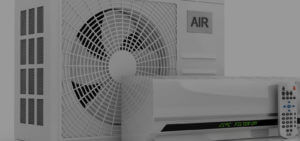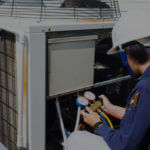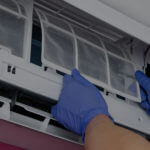When leaving for a vacation, it can be easy to overlook the steps needed to prepare your home for temporary vacancy. You might ask a neighbor to pick up your mail, water your plants, and walk your dog, but home maintenance can fall by the wayside. You know to turn off the main water value and to keep the heat indoors consistent throughout the winter to prevent the water pipes from bursting, but what about the summer?
The Importance of Turning on the A/C While on Vacation
Since you won’t be home to enjoy the cool air coming from your air conditioner (A/C), it probably seems like it would be safe to turn it off. But to avoid damage to your home, just like during the winter, it’s necessary to maintain a consistent indoor temperature. But why can turning off your heating, ventilation, and air conditioning (HVAC) unit be detrimental, and what temperature do you leave a vacant house in the summer? This article will evaluate the risks of turning off your air conditioning while vacationing in the summer.
Is Turning Off Your A/C Bad?
While it may be tempting to save some money by turning off your A/C, it’s not recommended. In fact, it could end up costing you more money by creating problems around the house. What the A/C temp should be when on vacation depends on how long you expect to be gone from the house.
If you’re only going to be gone for a few days, it’s best to keep your HVAC around the same temperature you normally keep it at. For longer stints, you can go ahead and set your thermostat anywhere between 85-90 degrees according to the Department of Energy. This should run your air conditioner enough to remove excess humidity and keep other parts of your home safe.
Rampant Humidity
Air conditioning doesn’t just cool down your home, it also controls the humidity levels. For optimum comfort and health, the humidity in your house should be no higher than 50%. If it’s higher than that, you run into condensation and common humidity-related problems like:
- Mold
- Musty smells and odors
- Peeling paint
- Warped wood furniture (floors, cabinets, etc.)
Stress on Appliances
Although refrigerators and freezers are made to maintain cold environments, they still have to function within a certain ambient temperature range. The correct temperature aids your appliances in completing tasks, while an environment that’s too hot will overwork them. A few problems that could be caused by turning off your air conditioning include:
- Placing stress on your refrigerator/freezer
- Increasing energy bills
- Breakdowns
- Spoiled food in your pantry
Damaged Electronics
Televisions, video game systems, alarm systems—most modern homes are full of electronics. Underneath the electronics’ casings or cabinets are a configuration of sensitive circuits that have been soldered together. High temperatures can melt soldering and fry circuits, ultimately ruining the devices. Allowing your home to reach high temperatures can cause the following damage to electronics:
- Melted circuits
- Damaged motors
- Cracked screens
Conclusion
For most homeowners who are going on vacation for a week or two, it’s probably best to keep your air conditioner on. But there’s no need to cool your entire home the same way you normally do—so turn your thermostat up. If you use a programmable thermostat, look for a vacation, hold, or away function. These settings will keep your thermostat from cooling your home on your normal schedule.
Air Cooling Your Way
At John’s Service and Sales, we want to help you stay cool during the hot summer months. If you’re looking for a cooling solution for your residence, then we have just what you need. We offer a range of air conditioners suited for various lifestyles, from window mounts to portable machines and more. To find your solution, feel free to browse through our online appliances store.



